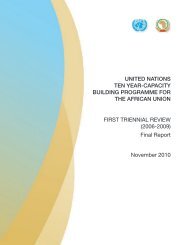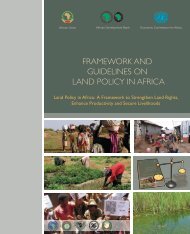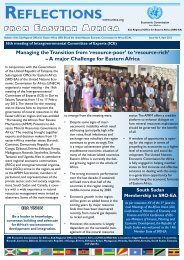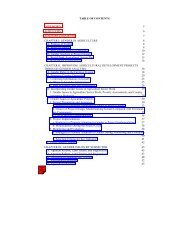A Decade of NEPAD - Economic Commission for Africa - uneca
A Decade of NEPAD - Economic Commission for Africa - uneca
A Decade of NEPAD - Economic Commission for Africa - uneca
You also want an ePaper? Increase the reach of your titles
YUMPU automatically turns print PDFs into web optimized ePapers that Google loves.
70 A <strong>Decade</strong> <strong>of</strong> <strong>NEPAD</strong>: Deepening <strong>Africa</strong>n Private Sector and Civil Society Ownership and Partnership<br />
The key actors and their involvement at the various stages<br />
<strong>of</strong> the APRM was put <strong>for</strong>th in a CSO manual developed<br />
by the UNECA in 2008.<br />
In terms <strong>of</strong> other ways in which <strong>Africa</strong>n CSOs have been<br />
involved with the implementation <strong>of</strong> <strong>NEPAD</strong>, beyond the<br />
national APRM processes, some CSO’s have been engaged<br />
in more adhoc aspects <strong>of</strong> the <strong>NEPAD</strong> Programme:<br />
ӹ Sectoral Framework Development – Development declarations<br />
by <strong>Africa</strong>n Heads <strong>of</strong> State and Government<br />
through the <strong>Africa</strong>n Union have been made in regard to<br />
a number <strong>of</strong> sectors: energy (2001), infectious diseases<br />
(2001, 2003, 2006), water (2002, 2004), peace and security<br />
(2002), agriculture and food security (2003, 2006),<br />
human rights (2003, 2005), governance (2005), education<br />
(2006), reconstruction (2006), water and sanitation<br />
(2008) and energy and transport (2009). In support <strong>of</strong><br />
these declarations, policy frameworks have been developed<br />
over the past tenyears <strong>for</strong> virtually all <strong>of</strong> the key<br />
sectors within the <strong>NEPAD</strong> programme. Furthermore,<br />
these sector policy frameworks have been developed<br />
through multi-stakeholder consultative processes:<br />
ӹ The <strong>NEPAD</strong> Spanish Fund <strong>for</strong> <strong>Africa</strong>n Women Empowerment<br />
– Since the establishment <strong>of</strong> this Fund, 6.3<br />
million Euros have been disbursed in support <strong>of</strong> 46<br />
projects in 23 countries, supporting gender initiatives<br />
in the following areas: democratic governance, agriculture,<br />
vocational skills training, micro credit, small<br />
and medium enterprises development, eradication <strong>of</strong><br />
gender based violence, promotion <strong>of</strong> the participation<br />
<strong>of</strong> women in decision making processes, sexual<br />
and reproductive health and HIV prevention services,<br />
promotion <strong>of</strong> participation <strong>of</strong> women in environment<br />
conservation practices and management, promotion <strong>of</strong><br />
human rights and elimination <strong>of</strong> disparities in primary<br />
and secondary education;<br />
ӹ The <strong>NEPAD</strong> e-<strong>Africa</strong> Youth Programme – In April 2006,<br />
the <strong>NEPAD</strong> e-<strong>Africa</strong> <strong>Commission</strong> in conjunction with<br />
the South <strong>Africa</strong>n Department <strong>of</strong> Communications<br />
agreed to support the <strong>for</strong>mation <strong>of</strong> a <strong>NEPAD</strong> e-<strong>Africa</strong><br />
Youth programme. The main objective was to build<br />
a cadre <strong>of</strong> young people who would raise awareness<br />
on issues <strong>of</strong> the In<strong>for</strong>mation Society and serve as active<br />
participants in building an inclusive In<strong>for</strong>mation<br />
Society in their countries and on the <strong>Africa</strong>n continent.<br />
Participants came from Botswana, Democratic<br />
Republic <strong>of</strong> Congo, Ethiopia, Kenya, Mali, Mauritius,<br />
South <strong>Africa</strong>, and Tunisia. The meeting came up with<br />
<strong>NEPAD</strong> e-<strong>Africa</strong> Youth Programme governance structures,<br />
roles, terms <strong>of</strong> reference and rules <strong>of</strong> procedures.<br />
A 3-year programme was agreed upon, which would<br />
be presented <strong>for</strong> adoption at the <strong>of</strong>ficial launch <strong>of</strong> the<br />
programme that would coincide with the main <strong>NEPAD</strong><br />
Youth Summit to be held in June 2006. The meeting<br />
agreed to foster partnerships with governments, business<br />
and civil society. The programme was to be linked<br />
to the flagship <strong>NEPAD</strong> e-schools programme and Governments<br />
would <strong>for</strong>m the programme focal points in<br />
their respective countries.<br />
ӹ The <strong>NEPAD</strong> Capacity Development Programme – In<br />
2006, the <strong>NEPAD</strong> Secretariat embarked upon a continent<br />
wide engagement process on capacity challenges<br />
in <strong>Africa</strong>. The process facilitated dialogue within <strong>Africa</strong><br />
and set in motion a process that led to the conceptualization<br />
and adoption <strong>of</strong> a capacity development strategy,<br />
The Capacity Development Strategic Framework<br />
(CSDF). The related <strong>NEPAD</strong> Capacity Development<br />
Initiative (CDI) has successfully managed to sensitize<br />
stakeholders on the <strong>Africa</strong>-wide CDSF and more targeted<br />
work has been undertaken in Ghana, Kenya, Rwanda<br />
and Uganda. The CDI’s engagement is aimed at putting<br />
into place processes that can enable the mainstreaming<br />
<strong>of</strong> CDSF into National Programmes <strong>of</strong> Action (NPoA).<br />
The CDI is also in the process <strong>of</strong> developing targeted<br />
interventions with stakeholders and sector groups,<br />
including agricultural parliamentarians and science<br />
linkages in collaboration with various partners, and<br />
capacity support to <strong>Africa</strong>n universities, tertiary and<br />
research institutions toward improving their relevance<br />
to national, sub-regional and continental development<br />
agenda planning processes.<br />
ӹ <strong>NEPAD</strong> Regional <strong>Economic</strong> Community Engagement<br />
with CSOs – In addition to the increasing focus on<br />
including CSOs into the various sector programmes<br />
<strong>of</strong> <strong>NEPAD</strong>, selected regional economic communities<br />
have also begun institutionalizing the input <strong>of</strong> CSOs<br />
into their planning and programme implementation<br />
processes. SADC and IGAD are two RECS leading the<br />
way in this regard. SADC has begun actively engaging<br />
CSOs in the development <strong>of</strong> the Regional Indicative<br />
Strategic Development Plan (RISDP) which is the REC’s<br />
strategic framework <strong>for</strong> deeper regional integration,<br />
poverty eradication and sustainable development. CSOs<br />
are also institutionalized contributors to the SADC<br />
National Committees, responsible <strong>for</strong> national engagement<br />
with SADC policy development matters and <strong>for</strong><br />
monitoring RISDP implementation. In addition, the







